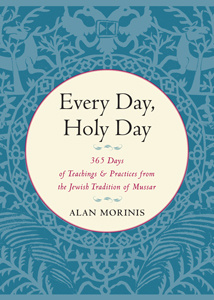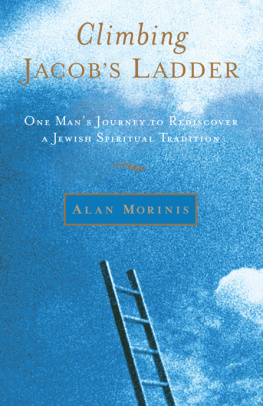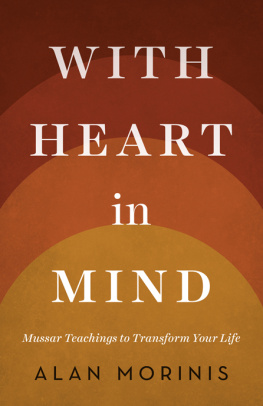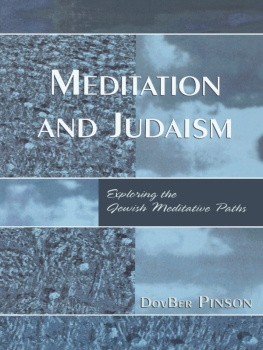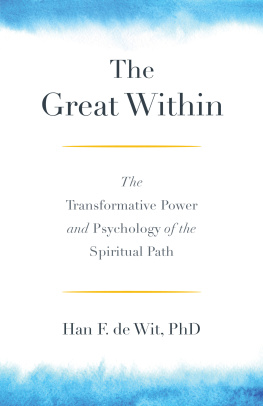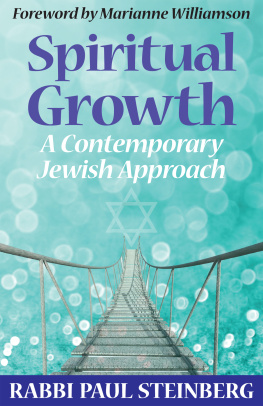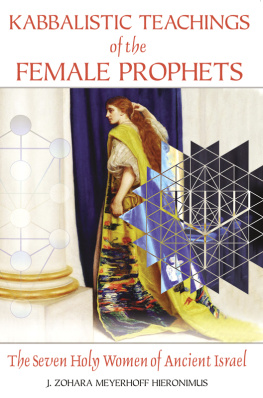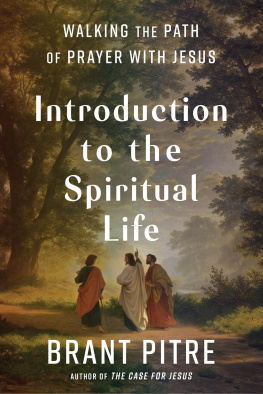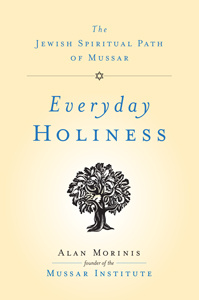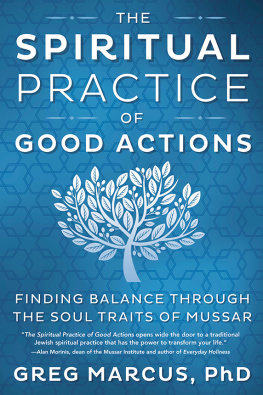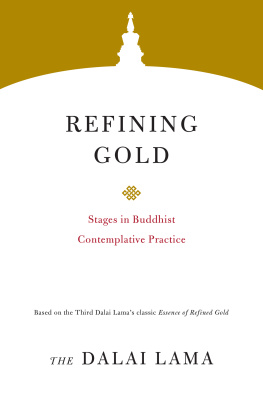You dont have to be Jewish to appreciate this way of refining and elevating your inner life and outward actions. Everyday Holiness is an exceptional resource, illuminating how true spiritual transformation can take place in our lives one day at a time.
Spirituality and Health
Clear and delightfully illustrated. Readers of any religion should take their time with this engaging tome of wisdom, lore, and suggested practice.
Publishers Weekly
A readable, engaging, friendly book.... [Morinis] writes as one besotted with the Jewish path, but not so intoxicated as to forget the conventions of the secular. Hes an accessible guide, and a sober one.
Jewish Daily Forward
ABOUT THE BOOK
Mussar is an illuminating, approachable, and highly practical set of teachings for cultivating personal growth and spiritual realization in the midst of day-to-day life. Here is an accessible and inspiring introduction to this Jewish spiritual path, which until lately has been best known in the world of Orthodox Judaism. The core teaching of Mussar is that our deepest essence is inherently pure and holy, but this inner radiance is obscured by extremes of emotion, desire, and bad habits. Our work in life is to uncover the brilliant light of the soul. The Mussar masters developed transformative teachings and practicessome of which are contemplative, some of which focus on how we relate to others in daily lifeto help us to heal and refine ourselves.
To learn more about the author, visit his website: www.mussarinstitute.org
ALAN MORINIS completed his doctorate at Oxford University, which he attended on a Rhodes Scholarship. A producer of award-winning television and film, he has been a student of the Mussar tradition since 1997, studying under Rabbi Yechiel Yitzchok Perr. Alan is the founder and director of the Mussar Institute, an organization that promotes the study of Mussar through study groups, courses, and public talks. He lives in Vancouver, British Columbia, with his wife and two daughters.
Sign up to learn more about our books and receive special offers from Shambhala Publications.

Or visit us online to sign up at shambhala.com/eshambhala.
Everyday
Holiness

The Jewish Spiritual Path of
Mussar
Alan Morinis

Trumpeter
Boston & London
2011
Trumpeter Books
An imprint of Shambhala Publications, Inc.
Horticultural Hall
300 Massachusetts Avenue
Boston, Massachusetts 02115
trumpeterbooks.com
2007 by Alan Morinis
Excerpts from The Sources of My Being and If Fear Is Like a Rock, from Jewish Poets of Spain, copyright David Goldstein. Reprinted with permission.
Excerpt from Thanks by W. S. Merwin from the March 14, 1987 edition of The Nation. Reprinted with permission.
All rights reserved. No part of this book may be reproduced in any form or by any means, electronic or mechanical, including photocopying, recording, or by any information storage and retrieval system, without permission in writing from the publisher.
The Library of Congress catalogues the hardcover edition of this book as follows:
Morinis, E. Alan.
Everyday holiness: the Jewish spiritual path of mussar / Alan Morinis.1st ed.
p. cm.
eISBN 978-0-8348-2221-4
ISBN 978-1-59030-368-9
ISBN 978-1-59030-609-3
1. Spiritual lifeJudaism. 2. Jewish ethics. 3. Musar movement. 4. Self-actualization
(Psychology)Religious aspectsJudaism. I. Title.
BM723.M68 2007
296.7dc22
20070006503
To my teachers,
Rabbi Yechiel Yitzchok Perr and
Rebbetzin Shoshana Perr:
may they be granted long, healthy,
and productive lives
Spiritual truths are not so much learned as recalled. Some ideas that we encounter, even if for the first time, dont strike us as new information but more like memories being reawakened within us. It is as if our hearts innately possess these truths and so we dont need lessons, only reminders of wisdom that we already know. These reminders awaken us, and then we see life more clearly and we know what we must do.
This book will serve its purpose if it awakens you to truths you will feel are already ingrained in your bones. In doing so, it will take its place in a long line of Jewish guides for living a meaningful, well-directed life. That lineage is the Mussar tradition, which offers you centuries of accumulated lessons to help you live your life right and truly, as life is meant to be lived. Even the idea that I am coming only to remind you of what you already know has a history, being part of the introduction to the Mussar classic, The Path of the Just, written by Rabbi Moshe Chaim Luzzatto in 1740.
Those who lived in the eighteenth century needed the same reminders as we do today. So much has changed in our world, but not human nature. In ways that really matter, you and I are little different from our ancestors. And so we are very fortunate that they recorded their lessons for living, so we can learn from their experience as we seek to find meaning and direction in our own lives. My intention is that this book will serve you by making available the teachings and wisdom of Mussar that have had such an enormous impact in my own life.
I could never have written this book, nor gotten as much from the Mussar tradition as I have, without the help of some key people. I want to thank my agent, Jim Levine, who knew what I would write about before I did, and supported it all the way; and Eden Steinberg, my editor, whose qualities of soul are exemplary, especially her equanimity and faithwhich were indeed tested.
I continue to be blessed with the guidance of my loving and wise primary Mussar teachers who awaken me with every contact, Rabbi Yechiel Yitzchok Perr and Mrs. Shoshana Perr, may they and their family live long and healthy lives.
Though a small group of Mussar teachers meets only once a year at the annual Mussar Kallah, these people have influenced me greatly, becoming beloved colleagues and friends. Among these great souls, I want especially to acknowledge Rabbi Ephraim Becker, Rabbi Micha Berger, Rabbi Eytan Kobre, Rabbi Elyakim Krumbein, Rabbi Zvi Miller, and Rabbi Ira Stone for all they have taught me and for the joy of having others with whom to traverse this road.
Words are too puny to capture the gratitude I feel for the forbearance and generosity shown me by the partners with whom I have shared learning. Mr. Shlomo Jakabovits, Dr. Seymour Boorstein, Rabbi Dovid Davidowitz, Rabbi David Mivasair, Rabbi Charles Feinberg, Rabbi Barry Leff, and Dr. Cheri Forrester have been my partners in the exploration of Mussar and other Jewish texts, often on a weekly basis. They have added so much to my life, and through my life to this book (though all that is faulty here is surely my own).
Interest in Mussar has grown to the extent that it has been necessary and desirable to create an institute to house this work, so that it can be made more widely available in an effective way. I am so grateful to the generous and hardworking members of the board of directors of the Mussar Institute: Jeff Agron, Dr. Sam Axelrad, Rabbi Micha Berger, David Goldis, Rabbi Eytan Kobre, Roger Low, Martha Rans, Carol Robinson, Gary Shaffer, Modya Silver, Dr. Bev Spring, and Suzanne Stier. Dr. Shirah Bell in particular has become a very special colleague, coteacher, sponsor, collaborator, and friend. May the merit of their gifts redound to them.
Next page
